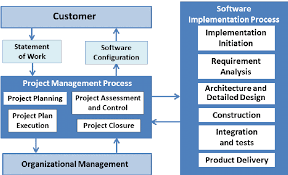Optimizing Software Project Planning in Software Engineering for Success
Software Project Planning in Software Engineering
Software project planning is a crucial phase in software engineering that lays the foundation for a successful project. It involves defining the scope, objectives, resources, timeline, and risks associated with the project. Effective planning is essential to ensure that the project is completed on time, within budget, and meets the desired quality standards.
Key Aspects of Software Project Planning:
Requirements Analysis: Understanding and documenting the requirements of the software project is vital. This phase involves gathering input from stakeholders, analyzing user needs, and defining the functionalities of the software.
Resource Allocation: Identifying and allocating resources such as human resources, hardware, software tools, and budget is critical for project success. Proper resource allocation ensures that teams have what they need to complete their tasks efficiently.
Timeline Development: Creating a realistic timeline with clear milestones helps in tracking progress and ensuring timely delivery of the project. It involves estimating the time required for each task and setting deadlines for completion.
Risk Management: Identifying potential risks that could impact the project and developing strategies to mitigate them is an essential part of software project planning. Risk assessment helps in proactively addressing challenges that may arise during project execution.
Benefits of Effective Software Project Planning:
Improved Efficiency: Proper planning leads to better organization of tasks, resource utilization, and time management, resulting in improved overall efficiency in project execution.
Cost Control: By accurately estimating resources and timelines during planning, organizations can control costs effectively throughout the software development lifecycle.
Quality Assurance: Planning allows for setting quality standards early on in the project, ensuring that deliverables meet customer expectations and industry standards.
In Conclusion
In conclusion, software project planning plays a pivotal role in the success of software engineering projects. By carefully defining requirements, allocating resources effectively, developing realistic timelines, and managing risks proactively, organizations can enhance efficiency, control costs, and deliver high-quality software solutions to their clients.
Key Benefits of Software Project Planning: Enhancing Clarity, Efficiency, and Quality
- Ensures clear understanding of project requirements.
- Facilitates effective resource allocation.
- Helps in setting realistic timelines for project completion.
- Enables proactive risk management.
- Improves team coordination and communication.
- Enhances efficiency in project execution.
- Aids in controlling costs throughout the project lifecycle.
- Ensures adherence to quality standards and client expectations.
Challenges in Software Project Planning: Overestimation, Resource Mismanagement, Rigidity, Poor Risk Assessment, and Stakeholder Disengagement
- Overestimation of project scope and requirements can lead to delays and budget overruns.
- Inadequate resource allocation may result in team burnout and decreased productivity.
- Rigid project plans may hinder adaptability to changing requirements or unforeseen challenges.
- Poor risk assessment and management can lead to project failures or setbacks.
- Lack of stakeholder involvement and communication can result in misunderstandings and dissatisfaction with project outcomes.
Ensures clear understanding of project requirements.
Ensuring a clear understanding of project requirements is a fundamental benefit of software project planning in software engineering. By meticulously analyzing and documenting the needs and objectives of the project during the planning phase, teams can align their efforts towards a common goal. This clarity helps in defining the scope of work, identifying potential challenges early on, and establishing a solid foundation for effective decision-making throughout the project lifecycle. Ultimately, a thorough understanding of project requirements minimizes misunderstandings, reduces rework, and enhances the overall quality of the final software product delivered to clients.
Facilitates effective resource allocation.
Facilitating effective resource allocation is a key advantage of software project planning in software engineering. By carefully identifying and allocating resources such as human resources, tools, and budget during the planning phase, teams can ensure that they have the necessary support to carry out their tasks efficiently. This proactive approach not only optimizes resource utilization but also helps in preventing bottlenecks and delays in project execution. Effective resource allocation enables teams to work collaboratively towards achieving project objectives within the defined timelines and budget constraints, ultimately leading to successful project outcomes.
Helps in setting realistic timelines for project completion.
Setting realistic timelines for project completion is a key advantage of software project planning in software engineering. By carefully estimating the time required for each task and considering potential challenges that may arise during the project, planners can create a timeline that aligns with the project’s scope and resources. This helps in managing stakeholders’ expectations, ensuring efficient resource allocation, and facilitating better tracking of progress throughout the project lifecycle. Realistic timelines not only contribute to on-time delivery but also promote effective time management and overall project success.
Enables proactive risk management.
Proactive risk management is a significant benefit of software project planning in software engineering. By identifying potential risks early in the planning phase, project teams can develop strategies to mitigate these risks before they escalate into larger issues during project execution. This approach allows for a more controlled and predictable project timeline, budget, and quality outcomes. Addressing risks proactively also helps in maintaining stakeholder confidence and ensuring that the project stays on track towards successful completion.
Improves team coordination and communication.
Effective software project planning in software engineering significantly enhances team coordination and communication. By clearly defining roles, responsibilities, and tasks at the planning stage, team members have a better understanding of their individual contributions to the project. This clarity fosters collaboration, reduces misunderstandings, and promotes seamless communication among team members. Improved coordination ensures that everyone is aligned towards common goals, leading to increased efficiency and productivity throughout the project lifecycle.
Enhances efficiency in project execution.
Effective software project planning significantly enhances efficiency in project execution. By carefully outlining tasks, setting clear objectives, and allocating resources appropriately during the planning phase, teams can streamline their workflow and minimize potential delays. With a well-defined plan in place, team members have a roadmap to follow, allowing them to work more cohesively towards project goals. This increased efficiency not only helps in meeting project deadlines but also improves overall productivity and output quality.
Aids in controlling costs throughout the project lifecycle.
Effective software project planning plays a crucial role in controlling costs throughout the project lifecycle. By accurately estimating resources, defining clear timelines, and identifying potential risks early on, organizations can proactively manage expenses and prevent budget overruns. This proactive approach to cost control not only helps in staying within the allocated budget but also ensures efficient resource utilization, ultimately leading to successful project completion within financial constraints.
Ensures adherence to quality standards and client expectations.
Effective software project planning in software engineering ensures adherence to quality standards and client expectations by establishing clear guidelines and objectives from the outset. By defining requirements, setting quality benchmarks, and outlining deliverables during the planning phase, teams can align their efforts with the desired outcomes. This proactive approach not only helps in meeting industry standards but also ensures that the final product meets or exceeds client expectations. Through meticulous planning, software projects can be executed with precision and attention to detail, resulting in high-quality solutions that satisfy both technical requirements and customer needs.
Overestimation of project scope and requirements can lead to delays and budget overruns.
One significant con of software project planning in software engineering is the tendency to overestimate project scope and requirements. When project managers and teams inaccurately assess the complexity and extent of work involved, it can result in unrealistic timelines, resource allocation issues, and ultimately lead to delays and budget overruns. Overestimation can strain project resources, cause unnecessary rework, and hinder progress, impacting the overall success of the project. It is crucial for organizations to conduct thorough requirement analysis and scope definition to avoid falling into the trap of overestimation during software project planning.
Inadequate resource allocation may result in team burnout and decreased productivity.
In software project planning, inadequate resource allocation can be a significant con that leads to team burnout and decreased productivity. When teams do not have the necessary resources, such as sufficient manpower, tools, or support, they may be overburdened with work and face unrealistic deadlines. This can result in increased stress levels, fatigue, and ultimately burnout among team members. As a consequence, productivity may suffer as exhausted team members struggle to meet project requirements effectively. Proper resource allocation is crucial to ensure that teams have the support they need to work efficiently and maintain a healthy work-life balance throughout the project lifecycle.
Rigid project plans may hinder adaptability to changing requirements or unforeseen challenges.
One significant drawback of software project planning in software engineering is that rigid project plans may hinder adaptability to changing requirements or unforeseen challenges. When project plans are too rigid and inflexible, they may not accommodate changes in requirements or unexpected obstacles that arise during the development process. This lack of adaptability can lead to delays, cost overruns, and ultimately, a failure to deliver a product that meets the evolving needs of stakeholders. It is essential for project planners to strike a balance between structure and flexibility to ensure that projects can adjust to changing circumstances while still staying on track towards successful completion.
Poor risk assessment and management can lead to project failures or setbacks.
In software project planning within software engineering, one significant con is the potential for project failures or setbacks due to poor risk assessment and management. When risks are not effectively identified, evaluated, and mitigated during the planning phase, unexpected challenges can arise during project execution. These unforeseen issues can lead to delays, budget overruns, quality issues, or even complete project failure. Therefore, neglecting proper risk assessment and management can have detrimental effects on the overall success and outcome of a software development project.
Lack of stakeholder involvement and communication can result in misunderstandings and dissatisfaction with project outcomes.
A significant con of software project planning in software engineering is the lack of stakeholder involvement and communication, which can lead to misunderstandings and dissatisfaction with project outcomes. When stakeholders are not actively engaged in the planning process or their feedback is not adequately considered, there is a higher risk of misaligned expectations and requirements. This can result in deliverables that do not meet the needs of the end-users or fail to address critical business objectives, ultimately leading to project delays, increased costs, and decreased overall satisfaction with the final product. Effective communication and collaboration with stakeholders are essential to ensure that software projects are aligned with organizational goals and user expectations.




